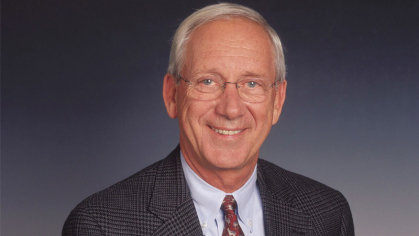Remembering Rutgers Economist Joseph Seneca

Joseph James Seneca, a University Professor Emeritus and former vice president of academic affairs at Rutgers University whose research on the New Jersey economy spanned five decades, died Nov. 27 after a long battle with cancer.
Throughout his long-standing career at Rutgers, Seneca touched the lives of thousands of students and influenced New Jersey economic policy, receiving numerous awards for exemplary teaching and public service. For many years, Seneca also served on and chaired the New Jersey Council of Economic Advisors, working closely with governors of both parties.
"Joe was a true multidimensional professional,’’ said James W. Hughes, University Professor and dean emeritus of Rutgers University’s Edward J. Bloustein School of Planning and Public Policy and a longtime collaborator with Seneca.
“He was a crucial and steadying administrative influence at Old Queens during some of the most difficult times in Rutgers history, yet he was simultaneously able to provide wise economic counsel to the political leadership in Trenton, pursue his scholarly research agenda and generously share his valuable time with Rutgers students and faculty. Very few individuals display such kindness or have such breadth and depth of commitment and service," Hughes said.
Some of Seneca’s high-profile work in the state included his role as a coauthor with Hughes of the Rutgers Regional Report, which provides regular analyses of current New Jersey economic issues.
Seneca, who was also a Distinguished Professor of Economics Emeritus, had recently been working on a series of fast track reports with Hughes to provide in-depth analysis of the pandemic’s impact on the state and national economy. He continued working on the project despite his illness.
"In conducting extensive research with Joe since 1990 – producing two books, many articles and more than 60 Rutgers Regional Reports – we had a tension- and disagreement-free partnership. This was solely due to Joe's maturity, calm demeanor, sound judgment and intellectual prowess,’’ Hughes said. “I was indeed fortunate to be able to pair up with him for so many years."
Seneca also served in the highest levels of Rutgers administration. From 1991 to 2003, Seneca served as vice president for academic affairs. In that role, he was chief academic officer for the university. He directly supervised the deans of the 11 degree-granting schools on the New Brunswick campus, the University Libraries, and several research centers. He helped steer the university through a difficult period that included severe cuts in state funding.
“Joe Seneca was an extraordinary leader in economics, at Rutgers and in New Jersey,'' said former Rutgers president Richard L. McCormick, University Professor and Board of Governors Professor of History and Education. "He was so good at everything he did. He always displayed exceptional expertise, wonderfully good judgment and deep kindness toward everyone he encountered.''

Seneca, whose research interests included environmental economics and policy, state and local economic development, and government regulation of business, provided extensive budgetary testimony in Trenton and numerous policy briefings in Washington, D.C. He was a frequent speaker to business, professional and governmental groups.
Seneca came to Rutgers University-New Brunswick in 1967 directly out of graduate school, eventually serving as chair of the economics department and before serving as vice president of academic affairs. He finished his career at Rutgers as a University Professor, one of the highest professorial ranks at the university.
Born in Philadelphia, Seneca received his undergraduate degree in economics, Phi Beta Kappa, from the University of Pennsylvania, followed by a Ph.D. in economics. There he met Rosalind, a British fellow student who became his wife of 50 years.
He published over 150 articles, reports and books. Two of his most recent books were published by the Rutgers University Press: America’s Demographic Tapestry and New Jersey’s Postsuburban Economy.
"Joe cared deeply about RU and personally about those who studied and worked there,'' said Nancy Winterbauer, former vice president for university budgeting who continued to be a close family friend of Seneca's.
"When he attended gatherings, large and small, he always engaged with as many people as possible. His warmth and genuine concern matched his academic expertise and made Joe a beloved and respected administrator and teacher,'' Winterbauer said.
An avid bird watcher, Seneca traveled worldwide to pursue his passion. He could instantly identify almost any bird in North America by sight or song.
He was also a passionate fan of the Philadelphia Phillies and could often be found at pickup softball games in Madison, N.J., where he lived for many years. Seneca had been a multi-sport athlete, and he played baseball or softball his entire life. Although deeply modest, Seneca’s one boast was that he had hit safely in seven consecutive decades, from the 1950s to the 2010s.
After retirement, Seneca and his wife moved to North Carolina to be near their son Matthew. He spent many summers sailing with his family at Westport Point, Mass. He was deeply devoted to Rosalind and Matthew, who survive him along with his sister Elaine.
Those wishing to contribute in Seneca’s memory may donate to the National Audubon Society, www.audubon.org.


